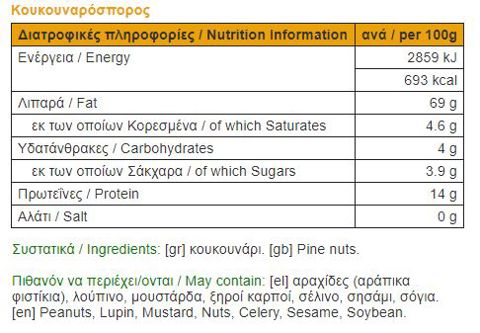FREE SHIPPING & DISCOUNTS
Free shipping on orders over 90 euros, enjoy 5% discount on orders over 40 euros. Get an additional 3% off on orders over 60 euros
shipping & paymentsPine nuts are the edible seeds of pines. About 20 species of pine produce seeds large enough to be worth harvesting. Pine trees grow chiefly in the wild cold and taiga forests of the northern hemisphere, particularly of Siberia and Canada. They are huge, straight trees with large stem which may reach incredible heights, attaining a pyramidal or umbrella like dense foliage cover.
Medicinal Applications:
• Pine nuts are one of the calorie-rich edible nuts and comprise of numerous health promoting phyto-chemicals, vitamins, antioxidants and minerals.
• They high caloric content chiefly comes from fats. Indeed, the nuts are especially rich in mono-unsaturated fatty acids like oleic acid that contributes in lowering LDL cholesterol and increase HDL cholesterol levels in the blood.
• Pine or cedar nuts contain essential fatty acid pinolenic acid. This has shown its potential in weight loss by curbing appetite. Pinolenic acid triggers the release of hunger-suppresant enzymes cholecystokinin and glucagon like peptide-1 in the gut. In addition, pinolenic acid is thought to have LDL lowering properties by enhancing heaptic LDL uptake.
• As in almonds, pines too are an excellent source of vitamin E which is a lipid soluble antioxidant, required for maintaining the integrity of cell membrane of mucus membranes and skin by protecting it from harmful oxygen-free radicals.
• Pine nut is a gluten free tree nut, and therefore is a popular ingredient in the preparation of gluten-free food formulas. Such formula preparations can be a healthy alternative in people with wheat food allergy and celiac disease.
• Pine nuts are an excellent source of vitamin B complex group of vitamins like thiamin, riboflavin, niacin, pantothenic acid, vitamin B6 and folates. These vitamins work as co-factors for enzymes in cellular substrate metabolism inside the human body.\
• Furthermore, pine nuts contain healthy amount of essential minerals like manganese, potassium, calcium, iron, magnesium, zinc and selenium. Pine nuts are indeed one of the richest sources of manganese, which is an all-imporant co-factor for antioxidant enzyme, superoxide dismutase. The consumption of pine nuts can therefore help the body develop resistance against infectious agents and scavenge harmful oxygen-free radicals.
Safety Profile:
There have been several reported cases of altered taste perception, called cacogeusia or pine mouth, following pine nut consumption. It appears a few days after eating the nuts and may persist for up to weeks. However it is not a serious medical issue that needs further attention.
Pine nut allergy can occur in sensitive individuals. The reaction symptoms may range from simple skin itching to severe form of anaphylactic manifestations, including breathing difficulty, abdominal pain, vomiting and dairrhea. Cross-reactions may also occur with some nuts and fruits, especially of Anacardiaceae family members such as mango, cashew nuts, pistachio etc.


Free shipping on orders over 90 euros, enjoy 5% discount on orders over 40 euros. Get an additional 3% off on orders over 60 euros
shipping & payments